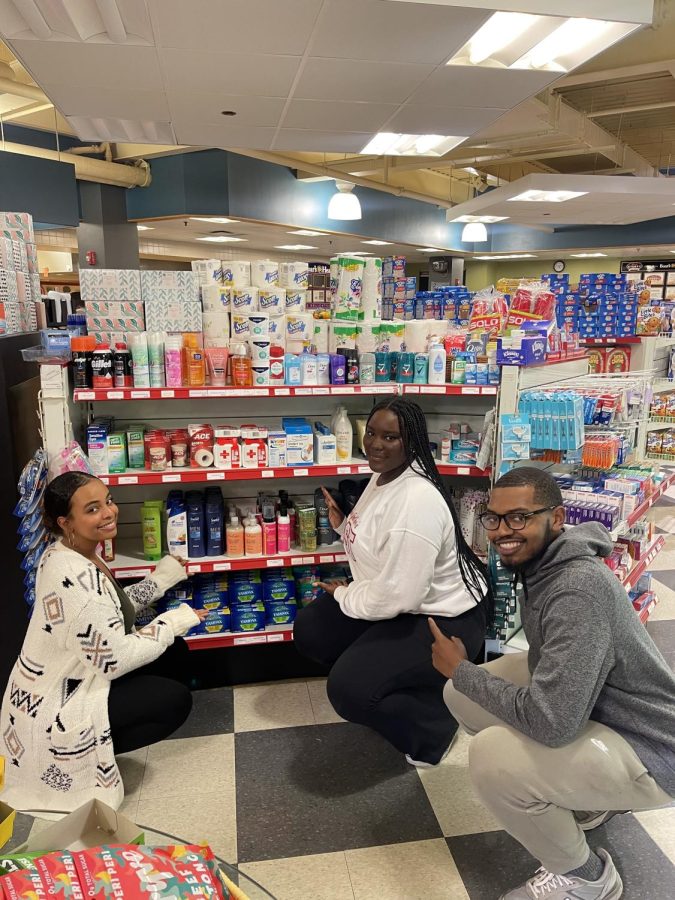Black Hair Care in Campus Convenience Stores
Black hair care products can now be found in the convenience stores on campus.
October 26, 2022
PWI is an acronym familiar to many University students, which stands for Predominately White Institution. As of 2021, the Villanova student population was made up of 5.9%, which definitely qualifies the University as a PWI. The University has earned nicknames like “Vanillanova” for its majority white population and lack of diversity within the student body.
However, in the wake of the summer of 2020’s racial reckoning, the University, like many other organizations across the nation, has put much more effort into becoming a more inclusive, diverse space.
As the number of Black students increases on campus, the amount of resources for the minority student population must increase as well. However, many students of color do not feel supported by the school’s administration.
The University’s DEI department’s mission statement reads as follows: “As a community that ‘insists that mutual love and respect should animate every aspect of university life,’ our Mission is to create and sustain a diverse, equitable, inclusive, and anti-racist living and learning environment for students and staff.”
There are many ways to care for Black hair, and because of the textural differences in hair between racial groups, many of the previously offered haircare services catered towards the University’s majority white population. Curly hair exists on a spectrum that can be categorized by the “curly hair chart,” organized by letters and numbers. Many students of color have a variety of curly hair types that require specialty products, like mousses, gels and leave-in conditioners.
Several Black students took matters into their own hands to enforce the DEI department’s mission statement and pushed for a more inclusive hygiene and self-care shelf in campus convenience stores. Black hair care was lacking from campus convenience stores, forcing Black students to search off campus for their everyday hair care products.
In conjunction with SGA’s DEI department, several students worked to get Black hair care in campus convenience stores. Junior Lauren Amoo and sophomore Meklit Mare were two students who spearheaded this project. The students were inspired by their own difficulties in obtaining natural hair care products while living at school. They put out polls to Black students to see what hair care products would be most needed after Amoo was inspired by an article about a school bringing in natural hair care vending machines. The students said the process was a relatively quick one that started with the polls and spreadsheets and ended with products on the shelves.
“We created a spreadsheet of all the different shampoo, conditioners, gels, etc. that we chose and within a couple of weeks, the products were ordered and on the shelves,” Mare said.
The students were inspired by their own difficulties in obtaining natural hair care products while living at school.
“Being someone who has natural curly hair and has to go outside Villanova’s campus to buy basic products, this project was something that I could personally relate to,” Amoo said. “Even though for some, hair products are not that big of a deal, as a Black woman, hair care is something that is a huge part of our identity and daily lives so being in a space that accommodates that is very important.”
Both students expressed their gratitude and excitement at being a part of this project.
“I feel really honored to be able to be a part of this project,” Mare said. “I feel very proud that DEI was able to take this step towards a more inclusive Villanova, and I also am very grateful that I was able to be a part of this project.”
Amoo and Mare, along with the DEI Department, are excited about this step for the University’s students of color.
“I think that the students of color will be very excited to hear that they don’t have to order their hair products on Amazon or go off campus to get basic hair products,” Amoo said. “Even for those who may not utilize those specific products, just having representation and feeling seen for those who have natural hair on a predominantly white campus is a very big deal.”
The natural hair care products in campus convenience stores have been a positive sign for students of color that change will continue to be implemented. Additionally, this step shows that students are the source of change.
“This step symbolizes the fact that there are steps being taken in the right direction for equity and inclusion but at the same time there is a lot of work that needs to be done,” Amoo said. “This is just the beginning.”












